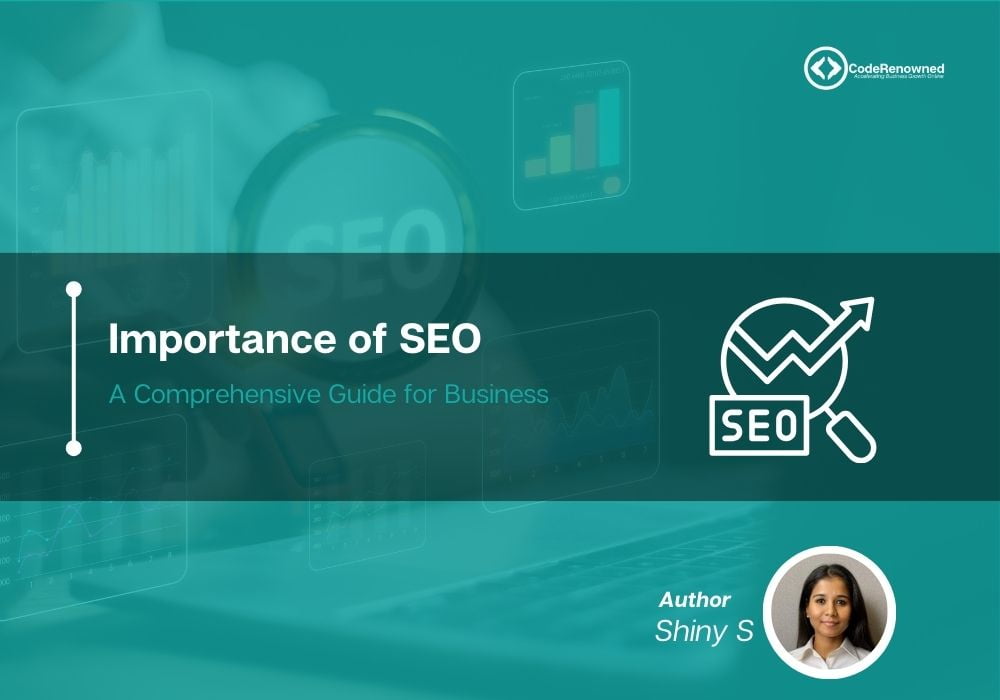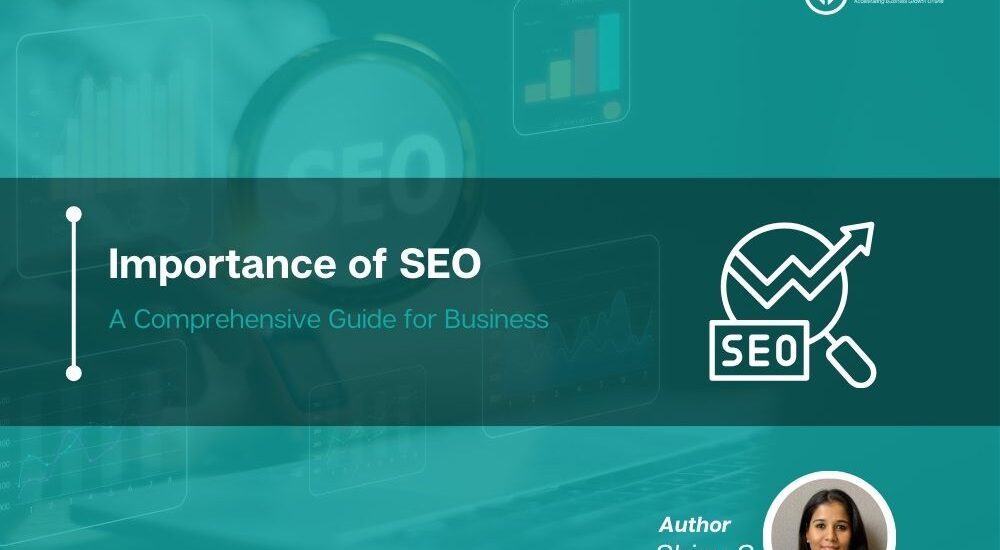Importance of SEO
A Comprehensive Guide for Business

A well-built online presence is essential for any business in this digital era. 68% of online experiences are with search engines. Search Engine Optimization (SEO) builds and maintains this presence. This comprehensive guide will explore the importance of SEO and why every business should prioritize it.
What Is SEO for Business?
Search Engine Optimization (SEO) is optimizing your website to rank higher in search engine results pages (SERPs) to increase organic (non-paid) traffic to your site. SEO encompasses strategies and techniques, including keyword research, content creation, on-page optimization, and link building.
Why is SEO Important? and SEO Marketing Benefits for Your Businesses?
Visibility and Traffic
The most significant benefit of SEO is increased visibility. When your website ranks higher in SERPs, more people can find and visit it. Here’s how SEO can boost the visibility:
- Higher Search Engine Rankings: Users Have eyes only on the top five suggestions in the search engine results. SEO helps the website to these top positions, pushing more traffic.
- Organic Traffic: Unlike paid advertising, SEO can drive 1,000%+ more organic traffic and is cost-effective and sustainable for the long term.
User Experience
SEO is also about improving user experience.
- Site Structure: A well-structured site makes search engines crawl and index the content by improving the rankings.
- Mobile Friendliness: With the High Usage of mobile devices, search engines prefer mobile-friendly sites. SEO is responsive, providing a seamless experience.
- Page Load Speed: Faster-loading pages offer a better user experience.
Credibility and Trust
Users trust the importance of search engine optimization for relevant and trustworthy results. Ranking high in search results can enhance your business’s credibility:
- High search engine rankings are the authority. When the site is on top, consumers think of it as a leader in the industry.
- SEO with high-quality, relevant content meets users’ needs to help with rankings and build trust with your audience.
Competitive Advantage
- A powerful SEO strategy ranks higher than your competitors in search results, bringing more traffic to your site.
- For businesses in local markets, local SEO ensures appearing in local search results to attract nearby customers and top local competitors.
Cost-Effectiveness
- Paid advertising stops yielding results when stopped paying, but SEO can attract organic traffic over time.
- SEO delivers a higher return on investment (ROI) than other marketing strategies as it targets users actively searching for your products or services.
Understandings of Customer Behavior
- SEO tools offer data on interaction with the site, search patterns, keywords used, and user demographics to refine your marketing strategies.
- Understanding potential customer searching allows us to tailor the content and meet market demand.
What are the Main Segments of SEO?
Keyword Research
Keyword research is a successful SEO strategy that involves identifying the words and phrases for potential customers to search for products or services in the industry. Effective keyword research helps to understand
- Search Volume: Search numbers for a particular keyword.
- Competition: difficulty in ranking a keyword.
- Relevance: Finding Keywords relevant to a business and target audience.
On-Page SEO
On-page SEO is to optimize individual web pages to rank higher and earn more relevant traffic. These Include:
- Title Tags: The webpage title should be exciting and include the target keyword.
- Meta Descriptions: A brief description of the informative webpage and target keyword in search results.
- Header Tags: Use header tags (H1, H2, H3) to make the content for search engines to understand.
- Content Optimization: Ensure high-quality, relevant content that includes your target keywords naturally.
- URL Structure: Use clean, descriptive URLs that include the keywords.
Off-Page SEO
Off-page SEO is activity outside the website that impacts your rankings. The most essential aspect is link building, which includes:
- Backlinks: Links from other websites to the site. High-quality backlinks from traditional sites improve the rankings.
- Social Signals: Shares, likes, and comments on social media platforms can influence your SEO by driving traffic.
Technical SEO
Technical SEO ensures the technical requirements of search engines for websites. These include:
- Crawlability: Making sure search engines can crawl and index the site.
- Site Speed: Optimizing the site’s load time.
- Mobile-Friendliness: Ensuring the site is responsive and gives a good experience on mobile devices.
- Secure Sockets Layer (SSL): Using HTTPS to secure the site.
How to Implement an SEO Strategy?
Implementing a successful SEO strategy needs an organized approach. The steps to follow are:
Set Clear Goals
Before dipping into SEO, clarify the goals. These could include:
- Increasing website traffic
- Improving search engine rankings
- Boosting online sales
- Enhancing brand awareness
Having clear goals helps for success and adjust the strategy as needed.
Conduct a Website Audit
A website audit estimates the site’s performance and identifies areas for improvement.
- Site Structure: Ensure the site is easy to navigate.
- Content Quality: Check for high-quality, relevant content.
- Technical Issues: Identify and fix technical problems affecting the site’s performance.
Keyword Research
- Conduct keyword research to identify the best keywords for the business.
- Use Google Keyword Planner, SEMrush, or Ahrefs to find keywords with high search volume and low competition.
Optimize On-Page Elements
For Better SEO Performance, Optimize the below elements
- Title Tags
- Meta Descriptions
- Header Tags
- URLs
Build Quality Backlinks
Building high-quality backlinks is essential for off-page SEO. Strategies include:
- Guest Blogging: Write articles for other websites in the industry and include a link to the site.
- Influencer Outreach: Collaborate with influencers to share the content and link to the site.
- Content Marketing: Create valuable content to be linked by influencers.
Monitor and Adjust the Strategy
- SEO is not a one-time effort.
- Continuously monitor the site’s performance and adjust the strategy.
- Google Analytics and Google Search Console can track the progress and identify areas for improvement.
What are the Common SEO Mistakes?
While implementing SEO, it’s essential to avoid mistakes that can delay the success:
Keyword Stuffing
- Overusing keywords in the content is keyword stuffing, which search engines often penalize.
- Create high-quality content that naturally includes your keywords.
Ignoring Mobile Optimization
- With the increase in mobile devices, ensure your site is mobile-friendly.
- Ignoring mobile optimization can impact your rankings.
Using Low-Quality Backlinks
- Low-quality or spammy backlinks can harm the site’s reputation and rankings.
- Focus on high-quality backlinks from authoritative sites.
Neglecting Technical SEO
- Technical SEO ensures the site meets search engine requirements.
- Neglecting technical aspects like site speed, crawlability, and mobile-friendliness can impact your rankings.
Ignoring User Experience
- SEO is about providing a good user experience.
- Ensure the site is easy to navigate, loads quickly, and offers valuable content.
How Important is SEO for the Future?
SEO is evolving, and staying updated with the latest trends and changes is required for success. Below are some emerging trends in SEO:
Voice Search Optimization
- Amazon’s Alexa and Google Assistant, optimizing for voice search is becoming increasingly important.
- Voice search queries are longer and more conversational. The focus should be on long-tail keywords and natural language.
Artificial Intelligence (AI) and Machine Learning
- AI and machine learning are transforming SEO as these technologies understand user intent and deliver more relevant search engine results.
- Stay updated with advancements in AI and adapt your SEO strategy.
User Experience (UX) and Core Web Vitals
- Google’s Core Web Vitals is a set of metrics to measure user experience, page load time, interactivity, and visual stability.
- These metrics are evolving ranking factors, so prioritize UX in the SEO strategy.
Video Content Optimization
- Video content is becoming popular, and optimizing the videos for search engines can drive more traffic.
- Focus on creating high-quality video content and optimizing titles, descriptions, and tags.
Mobile-First Indexing
- Google uses mobile-first indexing, meaning it uses the mobile version of a site for indexing and ranking.
- Ensure the site is for mobile devices.
Why SEO is Important for Small Businesses?
A Great online presence is essential for small businesses to flourish. Search engine optimization (SEO) unlocks potential and can seem complex for small businesses with limited resources. Below is a breakdown of its benefits:
SEO Benefits for Small Businesses:
- Search engines never care about company size. Strong SEO can compete with higher corporations by ensuring the website appears in search results for keywords the target audience uses.
- Attract the right customers! SEO helps users actively search, leading to higher conversion rates than generic advertising.
- SEO offers a sustainable, long-term strategy. While there can be initial investments, the benefits outweigh the costs. You reach a wider audience without paying for ads.
- High search engine rankings signal expertise and trustworthiness for your brand image and you as a leader in the local market.
- For businesses with a physical location, By optimizing your online presence, ensure potential customers for the products or services nearby.
Conclusion:
SEO is a crucial component of digital marketing strategy. It enhances online visibility, drives organic traffic, builds credibility, and provides valuable insights into customer behavior. By understanding the importance of SEO and implementing a well-rounded strategy, businesses can achieve long-term success and stay competitive.
Investing in SEO is not just about improving search engine rankings; it’s about building a healthy and trustworthy online presence that resonates with the audience and supports the business goals. Stay updated with the latest trends and continuously refine the strategy to stay ahead in the evolving SEO.







